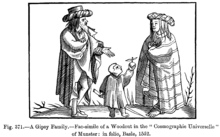
Back Κοινωνία και Πολιτισμός των Ρομά Greek Cultura gitana Spanish Ромско општество и култура Macedonian Культура цыган Russian Shoqëria dhe kultura rome Albanian Ромско друштво и култура Serbian Roman toplumu ve kültürü Turkish Культура циган Ukrainian
This article needs additional citations for verification. (July 2022) |

The Romani people are a distinct ethnic and cultural group of peoples living all across the globe, who share a family of languages and sometimes a traditional nomadic mode of life.[1] Though their exact origins were unclear,[2] recent studies show Kashmir in Northwest India is the most probable point of origin.[3] Their language shares a common origin with, and is similar to, modern-day Gujarati and Rajasthani, borrowing loanwords from languages they encountered as they migrated from India. In Europe, even though their culture has been victimized by other cultures, they have still found a way to maintain their heritage and society.[4][5] Indian elements in Romani culture are limited, with the exception of the language.[6][7] Romani culture focuses heavily on family. The Roma traditionally live according to relatively strict moral codes.[8] The ethnic culture of the Romani people who live in central, eastern and southeastern European countries developed through a long, complex process of continuous active interaction with the culture of their surrounding European population.[9]
- ^ "Who are the Roma people?". New Internationalist. 28 October 2013. Retrieved 2 April 2019.
- ^ K. Meira Goldberg; Ninotchka Devorah Bennahum; Michelle Heffner Hayes (2015). Flamenco on the Global Stage: Historical, Critical and Theoretical Perspectives. McFarland. p. 50. ISBN 978-0-7864-9470-5. Retrieved 8 December 2015.
- ^ "European Romanis came from northwest India". Nature India. 1 December 2012. doi:10.1038/nindia.2012.179.
- ^ Wiley, Eric (June 2005). "Romani Performance and Heritage Tourism: The Pilgrimage of the Gypsies at Les Saintes-Maries-de-la-Mer". TDR/The Drama Review. 49 (2): 135–158. doi:10.1162/1054204053971126. JSTOR 4488646. S2CID 57561829.
- ^ Berthier, Jean-Charles (1979). "The Socialization of the Gypsy Child". International Social Science Journal. 31 (3): 376–392.
- ^ Mróz, Lech (November 2016). Roma-Gypsy Presence in the Polish-Lithuanian Commonwealth: 15th – 18th Centuries. Central European University Press. ISBN 9789633861097.
- ^ Khati, Pooja (23 February 2016). "Meet the Roma: 2,000 years ago, the first 'Indians' to go to Europe". The Indian Express. Retrieved 26 May 2024.
- ^ Cunneen, Chris; Deckert, Antje; Porter, Amanda; Tauri, Juan; Webb, Robert (3 July 2023). The Routledge International Handbook on Decolonizing Justice. Taylor & Francis. ISBN 9781000904048.
- ^ Elena Marushiakova; Veselin Popov. "Development of Romani culture". rm.coe.int. Retrieved 1 January 2024.